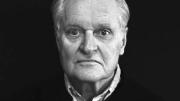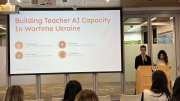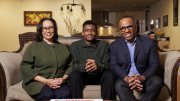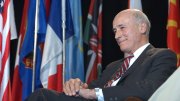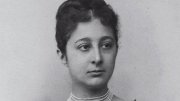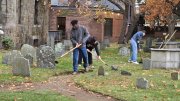Fifty years ago, John Ashbery ’49 was living in Paris and short on cash. He needed money to continue writing poetry, so he took up a job translating cheap detective novels from French into English. One novel meant one month of creation. Ashbery’s work, however, did not please his American editors. They wanted bodice-rippers, not crime tales. “I had to stop the action every once in a while and insert a sex scene,” the poet recounted during his April 30 visit to campus to accept the Harvard Arts Medal.
Ashbery’s poetry is often called obscure or difficult—he has said that he writes about the “experience of experience.” It is also incredibly vernacular. His poems, like the bodice-rippers, are filled with the vocabulary of daily life, even as they seek to express its deconstruction.
Nowadays, Ashbery no longer writes to please an editor—he sets the standard. Standing among the most respected and acclaimed poets of the twentieth century, he has earned almost every American award for poetry, from a Pulitzer Prize in 1975 for Self-Portrait in a Convex Mirror to a MacArthur Foundation “genius grant” in 1985. He now holds one more honor: the Harvard Arts Medal.
The medal celebrates alumni and faculty members whose excellence in the arts has served education or the public good. Ashbery joins a distinguished and wide-ranging group of artists—past recipients include composer John Adams ’69, film director Mira Nair ’79, and musician Pete Seeger ’40.
The medal is conferred annually at the beginning of ARTS FIRST, a celebration of the arts on campus. Besides recognizing Ashbery’s achievements, the informal and relaxed ceremony (held in a packed New College Theatre) celebrated the legacy and future of the arts at the University.
The ceremony began with readings of Ashbery’s poems, including “Some Trees” and “What is Poetry,” by eight young poets, students of Boylston professor of rhetoric and oratory Jorie Graham. Arranged in two lines across the stage, the students declaimed passages; the manuscripts and proofs of the poems were projected on a large screen behind them. As each spoke Ashbery’s words, the audience could follow the poet’s scrawls and corrections, as if tracking the poem back to its original source of creation.
After a brief introduction by John Lithgow ’67, Ashbery took the stage with Daniel Chiasson, Ph.D. ’01, a poet, critic, assistant professor of English at Wellesley College, and Ashbery scholar, for a discussion of his life and writing.
Chiasson began by asking Ashbery about his childhood. Ashbery said he had little access to poetry as a child in rural upstate New York, and that the poetry he did read was “cozy and reassuring,” with “a lack of aesthetic daring.” “I outgrew that sort of thing,” he said.
When he arrived at Harvard, Ashbery recalled, “I started enjoying myself right away.” From his freshman year, he immersed himself in the vibrant poetry scene on campus, taking a workshop with the poet Theodore Spencer. “I was so thrilled to have an actual poet read my poetry,” he said. His time at Harvard was a particularly fruitful one for the arts: he recounted crossing paths with poets Kenneth Koch, Robert Creeley, and John Hawkes, and as an editor on the Harvard Advocate, he published poems by Frank O’Hara.
Although both would later be part of the “New York School of Poetry,” Ashbery did not know O’Hara until his senior year of college. O’Hara seemed intimidating, Ashbery said: “He didn’t look like someone who would tolerate fools. It turned out he did, all too gladly.” When the two finally met, they quickly became good friends.
It’s often said that Harvard students learn as much from each other as they do from their professors; from O’Hara, Ashbery said he learned about artistic innovations his professors weren’t aware of. Ashbery said his friend knew about each ground-breaking development in the art world and was eager to share them: he read Samuel Beckett when the poet and dramatist (who would go on to win the Nobel Prize for literature) was still unknown to most. He introduced Ashbery to Shostakovich by playing him the Russian composer’s experimental pieces on the Eliot House piano.
The discussion also touched on the poet’s collages—many of which he composed in his room in Dunster House. Ashbery said he had originally wanted to be a painter, and visual art has had a large influence on his work. He wrote art criticism for Newsweek before shying away from deadlines, which, he confessed, have proved “a fertile source of nightmares ever since.” He took his inspiration for Self Portrait in a Convex Mirror, his best-known poem, from a work by the Italian painter known as Parmigiano. Ashbery said cutting up and rearranging images for collages helped him develop his distinct deconstruction of language:
I would look at magazines and make collages out of words. It was a way of looking at language and finding out what made it tick. I cut it up with the idea that when I had found out what made it work, I would glue it back together again.
At conversation’s end, President Faust bestowed Ashbery’s medal—suspended, appropriately, from a crimson ribbon. “As we launch our celebration of the arts,” she said, “we can think of no greater honor than to intersect with John Ashbery once again on his great voyage.”
